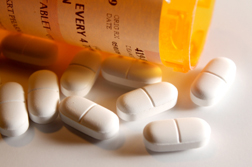 To understand what’s at stake for consumers, consider the case of Karen Bartlett. In 2008, Bartlett sued in the state of New Hampshire and was awarded $21 million after a generic medication called sulindac caused her to develop Stevens Johnson Syndrome (SJS). She’d been prescribed the medication for shoulder pain. After only a few weeks, her skin became hypersensitive. SJS patients often resemble burn victims. Almost 65 percent of Bartlett’s skin peeled off, and she was left nearly blind and severely disabled.
To understand what’s at stake for consumers, consider the case of Karen Bartlett. In 2008, Bartlett sued in the state of New Hampshire and was awarded $21 million after a generic medication called sulindac caused her to develop Stevens Johnson Syndrome (SJS). She’d been prescribed the medication for shoulder pain. After only a few weeks, her skin became hypersensitive. SJS patients often resemble burn victims. Almost 65 percent of Bartlett’s skin peeled off, and she was left nearly blind and severely disabled.According to the FDA, 80 percent of all prescriptions filled in the US are for generic drugs. That percentage is forecast to increase as more and more drugs come off patent.
Generic versions are cheaper, and insurance companies, doctors and pharmacies routinely give patients the non-brand-name version. Patients often don’t even know they are using the generic version.
When it comes to liability for those generic drugs that result in injury, there’s a patchwork set of decisions and verdicts that vary widely from state to state. Some lower courts have held the generic maker responsible, as in the Bartlett case, while other courts have found the opposite.
The brand-name manufacturers say they’re not responsible because the consumer didn’t buy it from them - they bought it from the generic manufacturer. Generic drug manufacturers argue they’re selling a copy of the original brand-name product and have no liability.
In the Bartlett case, now before the Supreme Court, Mutual Pharmaceuticals argues that the FDA requires generic manufacturers to carry the same warning and design labels as the original manufacturer. Mutual is arguing that since it didn’t write the labels, it is not responsible for what the labels say.
“I have a number of cases where the drugs involved are generic versions,” says Brian Kabateck, from the firm of Kabateck, Brown and Kellner in Los Angeles, referring to the anti-reflux medication Reglan and the acne medication Accutane.
“The wrong ruling from the Supreme Court on this means the generic drug manufacturers get all the upside and none of the downside,” he adds. “It is a lucrative business for these manufacturers. They’re asking for a licence to print money with no responsibility.
“And what about the consumer who did absolutely nothing wrong and is left with catastrophic injuries?” says Kabateck.
He’s not the only lawyer worried about the implications for clients.
“I don’t understand the rationale,” says Kathryn H. Clarke, an Oregon trial lawyer and president of the Pound Civil Justice Institute. “The generic company is manufacturing it and selling it. If it’s defective, they are responsible for it.”
The courts can be a mysterious place and the law can create absurdities. It seems that when the concept of generic drugs was introduced the question of liability for defective products and their impact on consumers was never fully resolved.
READ MORE PERSONAL INJURY LEGAL NEWS
It’s already difficult for consumers to sue generic drug makers and the Supreme Court could make it a lot harder. “One way or the other,” says Stewart, “the law is going to change here.”
As for Bartlett, she could lose her multi-million-dollar award and have to start all over again. And anyone taking a medication might want to find out if they are being prescribed the original drug or a copy, just in case something goes wrong.

READER COMMENTS
JAMES R BRESLIN
on